Summer Reading 2024
Warm weather brings with it freedom and leisure—and it can also call to mind the particular pleasure of losing yourself in a book. The relatively idle quality of summer opens up the chance to read something just for fun, or it provides a needed stretch of time for finally picking up the paperback that’s been patiently waiting on your bedside table. This year, The Atlantic’s writers and editors have chosen fiction and nonfiction to match all sorts of moods. Perhaps you want to transport yourself to another place, or you’re determined to learn something completely new. It’s also the right time to start the book you’ll read all summer or immerse yourself in a cult classic. You might hope to feel wonder about the universe or dive into someone else’s mind—or maybe you just need to indulge in a breezy beach read. Here are 25 books to pick up as your summer unfurls.
Transport Yourself to Another Place I Capture the Castle
I Capture the Castle by Dodie Smith
by Dodie SmithCassandra Mortmain, 17, lives in a crumbling medieval castle in 1930s England. Her father purchased it with the royalties from his one successful novel, the income from which has long since run dry. As an escape—and as practice for her own novel, which she hopes might spring her family from its now-less-than-genteel poverty—Cassandra has dedicated herself to “capturing” the characters around her in a diaristic, curious first person: irascible, blocked-writer father; bohemian stepmother; beautiful, dissatisfied older sister; lovelorn farmhand. Cassandra’s circumstances are at odds with her romantic temperament, but they animate her narration; charm, humor, and frustration spark off of every page. I Capture the Castle has the enjoyably familiar trappings of the Jane Austen marriage plot—there are wealthy bachelor neighbors and sisterly schemes in the damp yet charming English countryside. But in this book, the tropes collapse in on one another in comic and quietly poignant ways as the reader is welcomed into the nostalgic mood of interwar Britain, with its tea cozies and tweeds and trousseaus bought in London. It’s a novel that you sink into like a chintz armchair, only to emerge warm but wistful as the light fails and the evening mist appears. — Christine Emba
Wandering Stars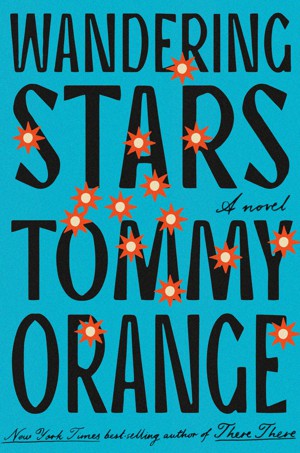 by Tommy Orange
by Tommy OrangeOrange’s previous novel, There There, conjured an interconnected cast of characters who were a part of a widespread Native community in Oakland, California. Wandering Stars, a sequel of sorts, is in part an exploration of what happens after the earlier book’s dramatic and painful ending—but it is also Orange’s attempt to provide a deeper, historical backstory to the contemporary, urban reality he described so well. The novel rewinds more than 100 years, beginning in the 19th century with a survivor of the 1864 Sand Creek Massacre and following his bloodline through the decades, with characters wandering to and around California until they end up back in the present day, in Oakland. You can’t understand these people unless you delve into the years of brutality and assimilation that brought them here, Orange implicitly argues—and he brilliantly captures the confusion of the youngest generation, which feels disconnected from its roots even as its inheritance weighs heavily. — Emma Sarappo
Someone Like Us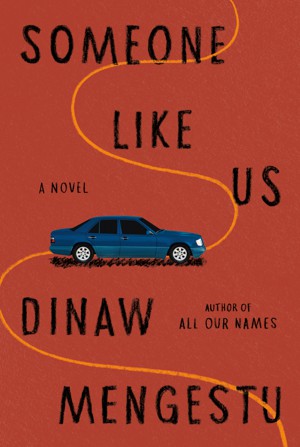 by Dinaw Mengestu
by Dinaw MengestuAt one point in Mengestu’s new novel, the main character, Mamush, having missed a flight from his home in Paris to Washington, D.C., decides on a whim to buy a ticket to Chicago instead. He’s not dressed for the freezing cold, which provokes a stranger’s concern, but Mamush remains nonplussed: “What she saw was a shadow version of me,” he thinks. “My real self was hundreds of miles away in the suburbs of northern Virginia.” The soul of this short, disorienting book, which drifts between continents and cities, does indeed lie in the anonymous, dense suburbs north and south of Washington, D.C. These communities are where Mamush, a failed journalist, grew up in a milieu of Ethiopian immigrants. Mamush’s French wife, Hannah, struggles to wrap her mind around these American nonplaces—and even Mamush fails to describe them with anything but the blandest words. “We lived in apartment buildings, surrounded by other apartment buildings, behind which were four-lane highways that led to similar apartments,” he remembers. His trip home, meant to be a family reunion, becomes a sobering and eerie voyage after a sudden tragedy. But as his visit unlocks long-buried memories and secrets, these places that began as ciphers end up specific enough to make the hairs on one’s neck stand up in recognition. — E.S.
Learn Something Completely New The Secret Life of Groceries
The Secret Life of Groceries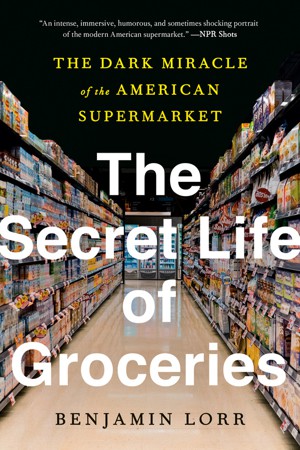 by Benjamin Lorr
by Benjamin LorrGreat nonfiction books take you into worlds you could never otherwise know: deepest space, Earth’s extremities, the past. The best nonfiction books explore places you know intimately but haven’t thought nearly enough about. The Secret Life of Groceries begins elbow-deep in trout guts and melting ice, a smell “thick in the air like you are exhuming something dangerous, which perhaps you are,” as the low-wage laborers who make a Manhattan Whole Foods fit for the daily rush do their best to clean the fish case. Lorr starts there because it’s a near-perfect metaphor for the American grocery store and its global machinery: It is gross, it is miraculous, it is where plants and animals become products, and where desire becomes consumption. After following him from specialty-food shows to shrimping boats to new-employee orientation, you’ll never think of groceries the same way again. — Ellen Cushing
Becoming Earth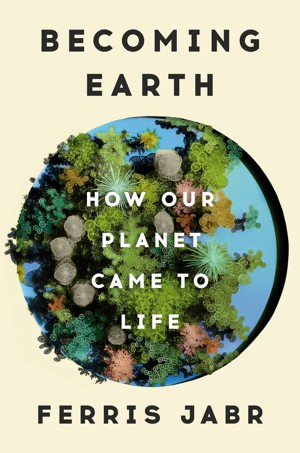 by Ferris Jabr
by Ferris JabrIn his new book, Jabr invites the reader to consider the true definition of life. Earth doesn’t just play host to living beings, in his telling; it’s alive itself because it is fundamentally made up of the plants and creatures that transform its land, air, and water. “Life, then, is more spectral than categorical, more verb than noun,” he explains. It is “not a distinct class of matter, nor a property of matter, but rather a process—a performance.” Plankton release gases that can alter the climate; microbes below the planet’s surface sculpt rock into caverns and, Jabr suggests, might have even helped form the continents. Jabr is a science journalist who has written searching articles on inter-tree communication, the possibilities of botanical medicine, and the beauty of certain animals; here, he travels from the kelp forests near California’s Santa Catalina Island to an observatory high above the Amazon rainforest in Brazil to his own backyard in Portland. Along the way, he makes a convincing, mind-opening case that “the history of life on Earth is the history of life remaking Earth,” which means that humans are just one part of a changing, multifarious whole—and that we must work urgently to mitigate our disproportionate effects on the planet. — Maya Chung
Daybook by Anne Truitt
by Anne TruittTruitt’s sculptures—tall wooden columns of pure color—are almost mystically smooth. But her writing, especially in her first published journal, Daybook, flies in the face of those unbroken surfaces: She chronicles her complex experiences as a mother and a working artist, giving readers an intimate look into how her biography and her process cannot be separated. Daybook, which covers Truitt’s life in the late 1970s, emerges directly from her maxim that “artists have no choice but to express their lives.” In her case, that means capturing serene meditations on the creative spark, recounting the labor of applying 40 coats of paint to her forms, and groaning over the financial discomfort of raising three kids. Most spectacular are her ruminations on how life is what we feed to art in order to make it grow. Watching her daughter take a bath is a source of inspiration. “I had been absorbing her brown body against the white tub, the yellow top of the nail brush, the dark green shampoo bottle, Sam’s blue towel, her orange towel, and could make a sculpture called Mary in the Tub if I ever chose to,” she muses. Daybook is full of all the luminous colors Truitt, who died in 2004, evoked—the soothing lilacs, blaring yellows, revolutionary reds. It’s a powerful lesson that an artist is not only a person who planes towering poplar sculptures but also someone who removes a splinter from a child’s finger. — Hillary Kelly
Delmore Schwartz: The Life of an American Poet by James Atlas
by James AtlasYou might not ever have heard of Schwartz, and it doesn’t really matter. Atlas’s biography of him is such a psychologically acute, stylishly executed portrait of a doomed genius and his milieu of New York intellectuals that it effortlessly propels the reader through its pages. Schwartz was supposed to become the American W. H. Auden; he had the potential to be the greatest poet of his generation, and his work provoked the awe of peers such as Saul Bellow (who loosely based the novel Humboldt’s Gift on Schwartz’s troubled life). Atlas depicts a legendary conversationalist, a brilliant wit (Schwartz coined the aphorism “Even paranoids have real enemies”), and a life brutally overtaken by mental illness. — Franklin Foer
Start the Book You’ll Read All Summer At the Edge of Empire
At the Edge of Empire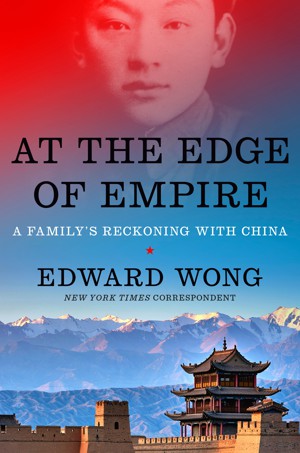 by Edward Wong
by Edward WongFor years, the only uniform that Wong, The New York Times’ former Beijing bureau chief, could imagine his father wearing was the red blazer he put on to go work at a Chinese restaurant every day. Then he saw a photo of young Yook Kearn Wong dressed as a soldier, and two stories opened up. His nonagenarian father had once been in Mao’s army and witnessed firsthand the Communist attempt to resurrect a Chinese empire; he dramatically left China in 1962 for Hong Kong and then Washington, D.C., disillusioned with what he had seen. This mix of memoir and efficiently recounted history covers 80 turbulent years. Wong is especially detailed about the decades his father spent in the People’s Liberation Army; he was sent to Manchuria, where he trained with the Chinese air force, and Xinjiang, where he met the Muslim populations of Uyghurs and Kazakhs that the state has struggled to subdue. Along with his father’s history, Wong unpacks his own years reporting on Xi Jinping’s consolidation of power and quashing of dissent—a mirror of what his father saw. This book’s power comes from Wong’s broad sense of the patterns of Chinese history, reflected in the lives of a father and son, and from his ability to toggle effortlessly between the epic and the intimate. — Gal Beckerman
Kristin Lavransdatter by Sigrid Undset, translated by Tiina Nunnally
by Sigrid Undset, translated by Tiina NunnallyKristin, the pivotal character in Undset’s historical 1,000-page trilogy, is introduced as a young girl in 14th-century Norway. She is the adored daughter of Lavrans, a widely respected nobleman who runs their family’s estate with wisdom and faith, and a member of a well-drawn social world of relatives, friends, and neighbors with defined feudal roles. As she grows up, she becomes beautiful, bighearted, and religious, though she is also willful and disobedient in ways that will bring her deep sorrow for the rest of her life. Kristin’s saga, rich with detail, has shades of Tess of the d’Urbervilles’ tragedy and Brideshead Revisited’s piety, but more than anything, the story is deeply human. Readers follow an imperfect, striving, warm, petty, utterly understandable woman from her childhood during the peak of medieval Norwegian strength to her death during the Black Plague, a time when Catholicism ordered social and political life but pagan traditions and beliefs were not yet forgotten. Her journey from maid to sinner to pilgrim to matriarch, first published in the 1920s, is gorgeous, fresh, and propulsive in Nunnally’s translation. A century later, spending weeks or months tracking the years of Kristin’s life remains wildly rewarding. — E.S.
The Bee Sting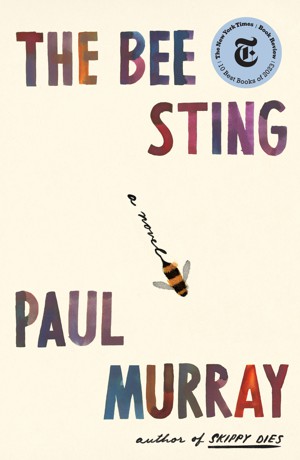 by Paul Murray
by Paul MurrayThe setup for the Irish author Murray’s fourth novel is a classic one: Take one family and explore its dynamics in intimate detail, turning it over to reveal all of its flawed facets, and expose it as a microcosm of larger social and cultural forces roiling us all. Jonathan Franzen is the current American master of this particular novelistic gambit, but Murray brings new energy to the enterprise with his portrait of the Barneses, Dickie and Imelda, and their two children, Cass and PJ. They’re a once-prosperous family living in a small Irish town; they’ve been suddenly struck down by the 2008 financial crash, which sends Dickie’s chain of car dealerships and garages into freefall. You could read this book in a week, and you’ll want to, but give yourself the whole summer to appreciate how fully Murray inhabits the perspectives of each family member chapter after chapter. Their psychologies—scarred in so many ways, both subtle and dramatic—become impossible to turn away from. After 600 pages, the elements Murray has been putting in place build to a wrenching climax, one that, like in all great tragedies, was foretold from the first page of this beautifully crafted book. — G.B.
Immerse Yourself in a Cult Classic In the Act
In the Act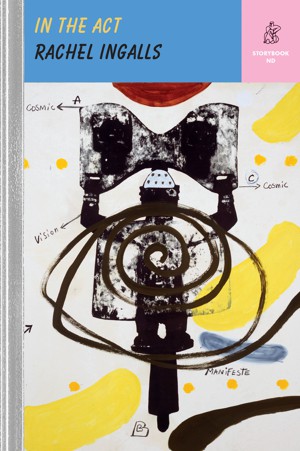 by Rachel Ingalls
by Rachel IngallsIf nothing else, read In the Act for the fights. Helen and Edgar, who are unhappily married, have developed a caustic fluency in the art of spiteful exchange. “You’re being unreasonable,” he says at one point. “Of course I am. I’m a woman,” she replies. “You’ve already explained that to me.” But also, read Ingalls’s sneakily brilliant 1987 novella for the absurd plot, which begins at a grouchy, oddball simmer—Edgar is adamant that Helen give him privacy to work on a mysterious project in the attic; Helen, suspicious of the sounds she hears up there, is determined to learn more—and ultimately reaches an exhilarating, tragicomic boil. In between, we discover the particular, creative way in which Edgar is two-timing Helen, the equally creative way in which she takes revenge, and just how delightful a story can be when each lean, mean sentence carries its weight. — Jane Yong Kim
Let’s Talk About Love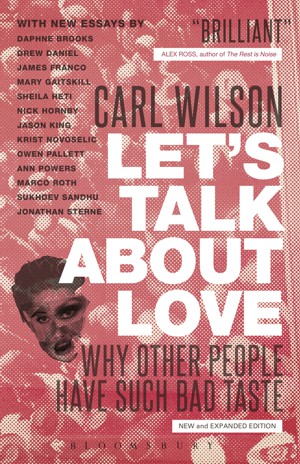 by Carl Wilson
by Carl WilsonWhat might a music critic with a knee-jerk distaste for Celine Dion stand to gain from careful, open-minded consideration of her work? This is the premise of Wilson’s 2007 touchstone of cultural criticism, which proved so popular that an expanded edition, released in 2014, includes response essays by luminaries such as Mary Gaitskill and James Franco. Let’s Talk About Love focuses on the singer of “My Heart Will Go On,” yes, but at its core it’s an investigation of taste: why we like the things we like, how our identities and social status get mixed up in our aesthetic preferences, and how one should wrestle with other people’s wildly different reactions to works of art. The book will have you scrutinizing your own preferences, but its true pleasure is unlocked simply by following along as a critic listens to music and thinks deeply about it—particularly one as intelligent, rigorous, and undogmatic as Wilson. — Chelsea Leu
Ripley’s Game by Patricia Highsmith
by Patricia HighsmithThe suave serial murderer Tom Ripley’s actions can be notoriously hard for readers to predict—but in Highsmith’s third novel about the con man, Ripley surprises himself. No longer the youthful compulsive killer of The Talented Mr. Ripley, the character is aging and getting bored. So when a poor man named Jonathan responds coolly to him at a party, Ripley fashions an elaborate drama for his own amusement: He cons the mild-mannered and entirely inexperienced Jonathan into taking a job as a freelance assassin targeting Mafia members, but the more Ripley watches Jonathan struggle with the task and his morals, the more Ripley itches to get his own hands dirty again. When I revisited Highsmith’s books ahead of their (rather dour) Netflix adaptation, I found myself unexpectedly drawn most to Ripley’s Game and its absurd humor. The novel explores a classic Highsmith preoccupation: how reducing strangers to archetypes can feel irresistible. Ripley is as much a petty meddler as he is a cold-blooded murderer—and that makes him endlessly fun to follow. — Shirley Li
Sirena Selena by Mayra Santos-Febres
by Mayra Santos-FebresIn 1990s San Juan, Puerto Rico, the drag queen Martha Divine hears a young boy singing boleros while picking up cans. She helps transform him into Sirena Selena—a beguiling drag performer who is soon invited to sing at a luxury hotel in the Dominican Republic and inspires an erotic obsession in one of its rich investors. Santos-Febres has pointed out that the Caribbean has long “been a desire factory for the rest of the world,” and her story looks squarely at the power dynamics inherent in these fantasies, especially those between tourists and locals. When it was published in 2000, Selena’s story was immediately heralded as crucial Puerto Rican literature, and it remains beloved partially for the force of its central allegory: Tourism, it argues, forces Caribbean people into a performance of exoticism—yet another type of drag. Santos-Febres will make you reconsider gender and the travel industry while luring you in with prose so sumptuous that reading it feels like putting on a pair of delicate satin gloves. — Valerie Trapp
Feel Wonder About the Universe You Are Here: Poetry in the Natural World
You Are Here: Poetry in the Natural World edited by Ada Limón
edited by Ada LimónThis collection of verse defines the natural world loosely: Here, yes, we have lovely descriptions of ancient redwoods and the “buttery platters of fungus” ascending their trunks; sparrows and spiderwebs and “geckos in their mysterious work.” But the book is largely about human nature, and our place in a world that contains so many other living things. An address to a saguaro becomes a meditation on immigration; a walk with a baby is tinged with sadness for the climate disasters surely to come; bearded irises give someone the strength to keep living; lilacs and skunk cabbage are envisioned through the haze of distant memory—it’s an ephemeral act, “like wrapping a scoop of snow in tissue paper.” Who are we, the poets ask, as individuals and as a species? How have our surroundings shaped our pasts and our presents, and what can they tell us about how to exist in the future? The Earth here is rather like a supporting character—a foil—who can surprise us, devastate us, and bring us back to ourselves. As Limón writes in a gorgeous introduction, she started repeating “You are here” to herself after seeing the phrase on a trail map. When I feel like a disembodied mind this summer, I’ll take myself to the ocean, this book in hand, and try doing the same. — Faith Hill
Lives Other Than My Own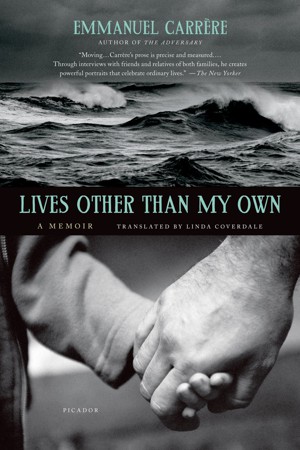 by Emmanuel Carrère
by Emmanuel CarrèreCarrère’s books demand some surrender on their reader’s part. You have to be okay not knowing exactly where the story—to the extent that there is anything resembling a traditional story—is going. You are there to spend time with his mind. Lives Other Than My Own, my favorite of his works, is no exception. It begins in Sri Lanka in 2004, where Carrère was witness to the tsunami that pulverized the island. Amid the immense death and destruction, Carrère befriends a French family whose little girl drowned in the waves. But just as Carrère pulls us into this grieving family’s emotional upheaval, his mind drifts. He returns from Sri Lanka to Paris and shifts his attention to his girlfriend’s sister, Juliette, a judge who has just died of cancer; he then carries out an investigation of sorts about the life she lived and the loved ones she left behind. The two strands don’t obviously connect—but they also make perfect sense next to each other. Each one fundamentally shakes Carrère, forcing him to ponder death, love, and how a meaningful existence comes together. — G.B.
Tentacle by Rita Indiana, translated by Achy Obejas
by Rita Indiana, translated by Achy ObejasTentacle may be a bit of a spooky read for this summer: In its world, initially set a few years into the future, the island of Hispaniola was devastated by a tidal wave in 2024 that wiped away coral reefs and food stands. But as you read on, the story asks you to let go of your attachments to chronology, flitting among three time periods: a post-storm island that is livable only for the ultrarich; an early-2000s milieu of beach-town artists; and a colonial-era past centered on a band of buccaneers. The book was originally written in Dominican Spanish and sprinkled with Yoruba and French, and the English translation retains a fiery love for the dynamic Earth. In one of the timelines, “an enormous school of surgeonfish” shoots out of a coral reef like “an electric-blue stream.” In another, the same sea is described as “a dark and putrid stew.” Holding voltaic awe in one hand and profound grief in the other, Indiana helps us see how the years behind us have led to our present climate crisis, and ignites a desire to fight for all we can still save. — V.T.
Dive Into Someone Else’s Mind Among the Thugs
Among the Thugs by Bill Buford
by Bill BufordEvery time I come across footage of January 6, I think of this book, the greatest study of mob violence ever written. Since its publication in 1990, English police have largely eliminated what was once euphemistically called “hooliganism” from the soccer stadium, but Buford’s first-person account of embedding with the Inter-City Jibbers, a group of pugilistic Manchester United fans, remains as readable and relevant as ever. He unforgettably recounts the experience of being pummeled by Italian police in Sardinia—and he describes the human capacity for brutality with terrible candor and compelling empathy. The violence he experiences is addictive, adrenaline-induced euphoria, as is his technicolor, emotionally vibrant account of it. — F.F.
Broughtupsy by Christina Cooke
by Christina CookeBy the time that 20-year-old Akúa travels back to Jamaica to see her estranged sister, she’s spent half her life in the United States and Canada. Before Akúa even arrives at her sister’s house, she begins to realize how difficult the transition to her birthplace will be. In the cramped taxi ride from the Kingston airport, other passengers joke with one another in patois, “their words flying hot and quick.” Akúa’s inability to join their banter leaves her feeling like she’s “listening through water,” one of many such indignities detailed by her evocative, searching narration. But language isn’t the only thing that weighs heavily on her relationship with the island; she also has to confront the grief and familial resentment that have unmoored her in the years since her mother’s death. Cooke’s vibrant debut novel is a queer coming-of-age story and a chronicle of diasporic rediscovery: Akúa makes new memories with her sister—and with rebellious strangers whose lives challenge the religious conservatism around them all. Along the way, Akúa’s loneliness starts to lift, and the island’s misfits help make Jamaica feel like home again. — Hannah Giorgis
Mina’s Matchbox by Yoko Ogawa, translated by Stephen B. Snyder
by Yoko Ogawa, translated by Stephen B. SnyderIn 1972, a young Japanese girl named Tomoko is sent by her mother to live with her aunt’s family in the seaside town of Ashiya. Things are a bit odd in their house: Her wealthy, half-German uncle disappears for long stretches; her sickly cousin, Mina, spends much of her time hidden away indoors, but rides a pygmy hippopotamus named Pochiko to school; her aunt searches for typos in books and pamphlets, obsessively identifying these “jewels glittering in a sea of sand.” Most enchanting are Mina’s many matchboxes, hidden underneath her bed, each of them featuring an intricate, beautiful picture. Mina collects them like talismans and writes devastating stories about the characters that appear on their illustrated labels. Everything, from the eerie events that happen at home to the bigger, global events such as the terror attack at the 1972 Munich Olympics, is filtered through a child’s perspective—curious but lacking adult judgment. Tomoko’s narration is subtle, almost detached, but the reader is immersed in her ardent love for her fragile cousin, and comes to appreciate how history seeps into every life, even the most sheltered ones. — M.C.
This Is Salvaged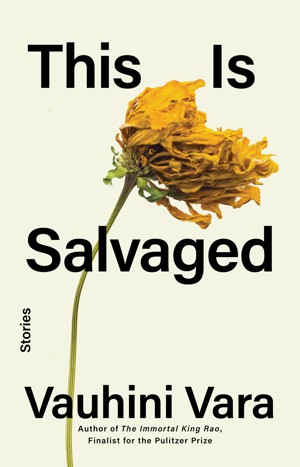 by Vauhini Vara
by Vauhini VaraThe physical experience of being a human is pretty weird, with our little flappy arms and occasional runny noses. To read Vara’s short stories is to briefly inhabit a mind attuned to the fumbling and freedom of having a body. One character draws our attention to “a crust clinging in the tiny bulbed corner” of an eye. Another pronounces that we don’t “talk enough about labial sweat.” Even flowers are not immune to the indecency of physicality: “Blooming seemed too formal for what the flowers were doing on their stems. They were doing something obscene: spurting; spilling.” Vara injects that same irreverence into all of her characters’ situations: Two girls work as phone-sex operators after the death of one of their siblings. One woman transforms into a buffalo. “I felt wet, porous, as if the world were washing in and out of me, a nudity of the soul,” says another character. These stories, similarly, reveal the leaky boundaries between our bodies and the universe, and bare what’s vulnerable, and beautiful, underneath. — V.T.
Indulge in a Breezy Beach Read Glossy
Glossy by Marisa Meltzer
by Marisa MeltzerThere was a brief moment in 2017 when The Atlantic’s London bureau shared a WeWork floor with the U.K. marketing team for Glossier, and this was when I first became fascinated with the cult beauty brand, its playful tubes of color, and its virtuoso Instagram presence. Meltzer’s 2023 book, Glossy, is a rich, gossipy history of the company’s rise. But it’s also a fairly succinct examination of womanhood in the 2010s: the cursed girlboss ethos, the growth of social media, the aesthetic nature of aspiration in a moment when feminism was a trend more than a movement. Meltzer thoroughly examines how Glossier’s founder, Emily Weiss, ascended seamlessly from her supporting role on The Hills to blogging to founding a billion-dollar brand; the book delivers thrilling details and structural analysis along the way. (Beauty is a business with extremely high profit margins, which explains a lot about its ubiquity in our culture when you think about it.) Mostly, the book left me marveling at how selling a business in this environment was as much about selling yourself as any particular product. — Sophie Gilbert
The Coin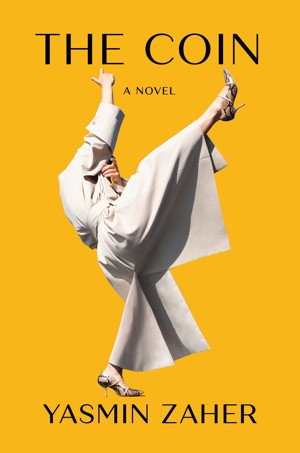 by Yasmin Zaher
by Yasmin Zaher“Woman unravels in New York City” is hardly an innovative storyline for a novel. Yet The Coin, the Palestinian journalist Zaher’s debut—which is, yes, about a woman unraveling in New York City—feels arrestingly new. Its unnamed protagonist, a Palestinian multimillionaire who teaches at a middle school for gifted, underprivileged boys, is a neat freak, a misanthrope, a dirty-minded isolate who dislikes the United States profoundly but lives there because “I wanted a certain life for myself … Wearing heels was important to me.” Her narration is spiky and honest, her choices gleefully, consciously bad. The pleasure she takes in making those decisions and then recounting them is what makes The Coin both unusual and compelling. Our protagonist denies herself nothing she wants, and she denies her audience no detail. The combination renders the book tough to put down. — Lily Meyer
The English Understand Wool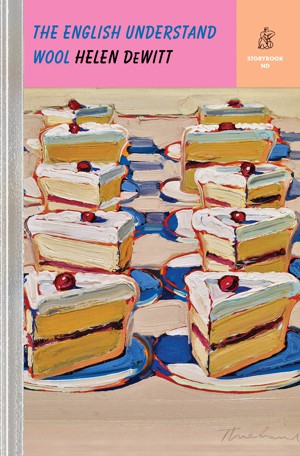 by Helen DeWitt
by Helen DeWittMy copy of The English Understand Wool came with a little silver sticker on the front proclaiming it actually funny. Perspicacious sticker: This book is funny in the sense that it will make you laugh—for real, out loud, more than once—but also in the sense that it’s a little off-kilter and unlike anything else. Its narrator is Marguerite, a 17-year-old who has been taught by her elegant, commanding maman to play piano and bridge, spot fine tailoring from a distance, and live a life unmarred by mauvais ton: “bad taste.” On a trip to London from their home in Marrakech, Marguerite learns something that elevates the novella from a charming comedy of manners to a truly divine combination of psychological thriller, caper, tender coming-of-age story, and barbed publishing-industry satire. It also does all of this in just over 60 pages, making this a book you can actually finish over a single drink from your beach cooler—though once you do, you may well return to the beginning to try to figure out how DeWitt pulled it off. — E.C.
The Birthday Party by Laurent Mauvignier
by Laurent MauvignierDespite its title, The Birthday Party isn’t … fun, per se. It’s violent and exceedingly dark; when it was longlisted for the 2023 International Booker Prize, the judges said, “It is a very scary book.” And it’s not a quick read—following a couple, their young daughter, and that family’s lone neighbor as they’re visited by three menacing men, the plot is unspooled detail by minute detail over the course of roughly 500 pages. Single sentences stretch on so long that by the end of one, you might have forgotten its beginning. But the novel, in its own way, is breezy: Mauvignier drifts gently as a leaf in the wind among characters’ perspectives, swirling acrobatically through their interior worlds and sketching their psyches finely before he plunges them into terror. The first explicitly frightening event happens about 100 pages in; by that point, I’d come to care about these people a great deal, and my jaw hurt from anxious clenching, knowing something bad was on the way. The action is made more suspenseful because it explodes in slow motion—gripping enough to make you forget about the sand in your teeth and the seagull circling your sandwich. That’s my kind of beach read. — F.H.


